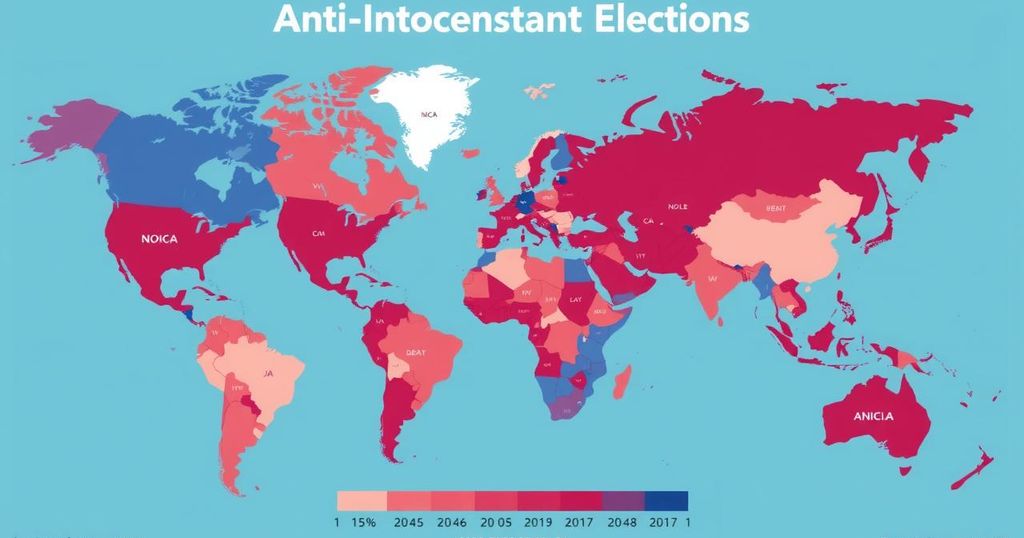In 2024, global anti-incumbent forces gained momentum as political leaders faced electoral defeats across various nations. Social media contributed to increased political polarization, revealing voters’ dissatisfaction with current governments. The article argues for a shift toward engaging directly with citizen concerns and fostering economic growth to restore public trust, while emphasizing the need for a hopeful political vision going forward.
In 2024, the world witnessed a remarkable shift in political landscapes as incumbents faced unprecedented challenges, resulting in widespread electoral defeats and political upheavals. Prominent officials, such as UAE Minister of Cabinet Affairs Mohammad Al Gergawi, emphasized the crucial role of government in “designing a future which gives citizens hope,” advocating for a transition from reactive governance to proactive and optimistic agenda setting. Political leaders appear tasked with not just responding to crises but actively cultivating a vision for a more hopeful future, particularly as citizens increasingly demand change.
The anti-incumbent wave unfolded across numerous nations. In March, Senegalese President Macky Sall experienced a decisive defeat after his attempt to delay elections failed. June brought further upheaval as South Africa’s African National Congress lost its historical majority for the first time in thirty years, leading to coalition governance. Meanwhile, Indian Prime Minister Narendra Modi’s Bharatiya Janata Party also lost its parliamentary dominance.
This trend persisted, with the Labour Party’s significant victory in the July general election in Britain ending a 14-year Conservative reign. October also saw dramatic shifts, including Japanese Prime Minister Ishiba Shigeru’s ruling Liberal Democratic Party losing its majority for the first time since 2009, and the ousting of French Prime Minister Michel Barnier via a no-confidence vote, marking a historic moment. Political instability worsened across Europe, with German Chancellor Olaf Scholz facing a vote of no confidence and Canadian Prime Minister Justin Trudeau experiencing a broader administrative shake-up.
Uprisings further punctuated the anti-incumbent sentiment, as seen in August with Bangladeshi Prime Minister Sheikh Hasina’s escape amid protests and Syrian President Bashar al-Assad’s eventual flight to Russia following regime collapse. The reasons behind such losses are multifaceted, with social media playing a pivotal role. Increasing access to the internet often correlates with dwindling trust in government institutions and heightened political polarization, as seen prominently within the United States.
While social media has been suggested to boost support for far-right populism, recent election results reveal a complex juxtaposition. In countries like Mexico, Spain, Greece, Ireland, Britain, Japan, and South Africa, mainstream parties faced setbacks but retained power. This suggests that to effectively navigate contemporary politics, governments must harness social media to engage directly with the electorate. Notable anecdotes, such as those from Grimsby, England, reveal prevalent sentiments of distrust and disconnection from politicians, echoing descriptors like “distant,” “authoritarian,” and “untrustworthy.”
Restoring trust in governance necessitates a focus on economic growth and empowering citizens. A study conducted in 2022 highlighted that political conditions are heavily influenced by economic factors, and rising unemployment alongside cuts in social services significantly impact public perception. This dynamic can elucidate the varying electoral outcomes across Europe: while Spain and Greece saw re-elected incumbents in the face of economic growth, France’s ruling party failed in unfavorable conditions.
Moreover, leaders must confront the larger narratives that shape the future they are offering. The existing political narratives often focus narrowly on annual budget cycles, which fail to inspire a hopeful vision among voters, many of whom experience ongoing economic challenges exacerbated by rising living costs. Historical examples, such as the New Deal and postwar welfare initiatives, illustrate that ambitious government agendas can emerge even during tough economic times.
A politics centered on hope is imperative for revitalizing confidence in democratic institutions. Citizens in Grimsby expressed a desire for politics that is seen as “realistic,” “meaningful,” “passionate,” and “empowering.” To meet these aspirations and restore the public’s trust, political leaders must engage creatively with their communities and generate a vision for the future, leveraging the expertise of visionary individuals in both the public and private sectors. Such proactive engagement could ultimately foster a government worthy of its citizens’ trust.
The context of this article revolves around the significant political trends observed globally in 2024, where incumbents faced a challenging landscape marked by defeat and public upheaval. Key factors contributing to this anti-incumbent wave include the impact of social media on public perception, economic conditions affecting trust in government, and the urgent need for political leaders to offer a hopeful vision for the future amidst rising discontent among constituents. These elements underscore the shifting dynamics in governance and public engagement in contemporary society.
In summary, the 2024 elections signify a critical turning point where incumbents around the world were challenged vigorously, reflecting a broader anti-incumbent sentiment rooted in economic dissatisfaction and fractured trust in government. To navigate such challenges, political leaders must engage meaningfully with the public, focus on economic growth, and cultivate a hopeful vision for the future. By tapping into local knowledge and ambition, they can foster a politics of hope that restores faith in democracy and democratic institutions.
Original Source: www.aspistrategist.org.au






